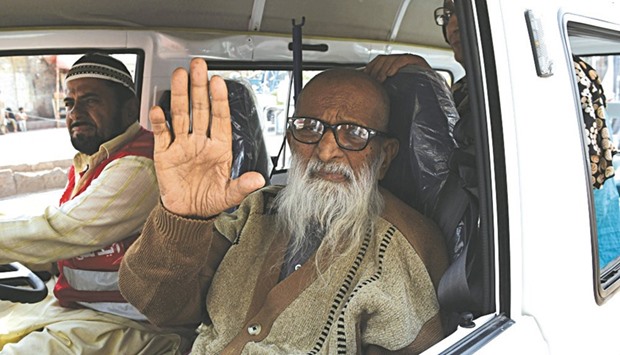The founder of Pakistan’s largest welfare organisation, Abdul Sattar Edhi, died yesterday at the age of 88, as tributes swiftly poured in for the humble man almost unanimously revered as a national hero.
“Abdul Sattar is dead,” his son and heir to his charitable empire Faisal told AFP.
“My father was suffering from severe kidney problems and both of his kidneys had failed,” he said.
He said that Edhi’s funeral prayers would be offered today after Zuhr prayers at Memon Masjid, after which he would be laid to rest at Edhi village.
“He wished to be buried in the same clothes he used to wear. He also wanted to donate his body parts, but only his cornea can be donated as rest of the organs were not in healthy condition,” said Faisal.
Social media quickly lit up in honour of the man whose work uplifting the nation’s destitute and orphans cemented his place in the hearts of Pakistan’s masses.
“May Allah give Edhi Sahib the best place in paradise and make his journey to Ahkira (the world hereafter) easy,” said Prime Minister Nawaz Sharif in a statement released to media. “He was a real gem and asset for Pakistan. We have lost a great servant of humanity,” Sharif said.
“Edhi’s tireless work has helped save hundreds of thousands of lives and shown us what it means to be a man who works for the people”, read a statement issued by the Prime Minister’s Office. “Despite all his success, he has always stayed humble, living a simple life in a small house barely large enough to encapsulate his enormous heart.”
Pakistan’s army chief Gen Raheel Sharif also expressed his condolences to Edhi’s family, lauding him as a “true humanitarian”.
Others lauded him as “the greatest Pakistani”, calling his death a “national tragedy”.
Motivated by a spiritual quest for justice, over the years Edhi and his team created maternity wards, morgues, orphanages, shelters and homes for the elderly - all aimed at helping those in society who cannot help themselves and picking up where limited government-run services fell short.
His work was so widely respected by across Pakistan that armed groups and bandits were known to spare his ambulances. Edhi’s foundation also provides technical education to the disadvantaged, religious education for street children, consultations on family planning and maternity services, as well as free legal aid, financial and medical support to prisoners and the handicapped.
Frail and weak in his later years, Edhi appointed his son Faisal as managing trustee in early 2016.
Edhi was been nominated several times for the Nobel Peace Prize, and appears on the list again this year - put there by Malala Yousafzai, Pakistan’s teenage Nobel laureate.
“I have done a lot of work. I am satisfied with my life,” he told AFP in an interview earlier this year.
The Pakistani government had conferred its highest civilian award on Edhi for his work.
Born to a middle class family in 1928 in the city of Gujarat in India before the partition of the sub-continent, Edhi began his charitable work with a healthcare centre in Karachi in the 1950s.
The government in the southern province of Sindh yesterday announced three days of official mourning.
Despite the vast sums of money that passed through his foundation, Edhi lived modestly with his family in a two-room apartment adjacent to the headquarters of his foundation.

Abdul Sattar Edhi: tributes
